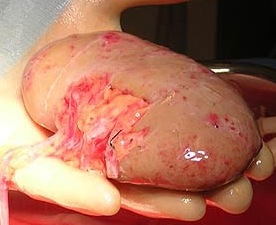I’m yet to work in a place that sees lots of renal transplant patients, hence the set of notes! If you have any thoughts or tips please let me know in the comments.
THE TRANSPLANT
- commonest transplant
- anastamosed to common iliac artery and vein in the pelvis. the ureter is plumbed into the bladder
- allows ease of access for palpation and biopsy
- kidney will be matched for HLA and MHC to minimise rejection but this is never guaranteed
- immune suppression is induced prior to surgery and maintained long term. The drugs involved are usually different
PROGNOSIS
- graft survival 95% for matched, living donor.
- about 90% for cadaveric donors
EARLY COMPLICATIONS
- vascular
- renal artery thrombosis
- high BP
- low urine Na
- needs surgical intervention
- renal vein thrombosis (
- pain
- fever
- high BP
- proteinuria
- needs anticoagulation
- Infection – up to 20% following surgery
- ureteric obstrction
- get an ultrasound – really important
- acute rejection
- pain
- fever
- high BP
- needs a biopsy to confirm
LATER COMPLICATIONS
- new renal disease
- chronic rejection
- slow rise in creat
- no real treatment
- infection
- common and often odd
- they still get common or garden UTIs but there are lots of weird and wonderful infections in transplant patients that don’t present as you might expect.
- of note the commonest presentation of meningitis is simply headache so low threshold for sticking a needle in their back.
VACCINES
- dead vaccines and immunoglobulin fine
- live or attenuated vaccines (MMR, polio, BCG etc) are contraindicated
MEDICATIONS THEY’RE ON
- this is where it gets tricky. I’m not going to give lots of details as the important message is – look it up
- the medications all increase cancer risk
- esp lymphoma, cervical and skin cancer

